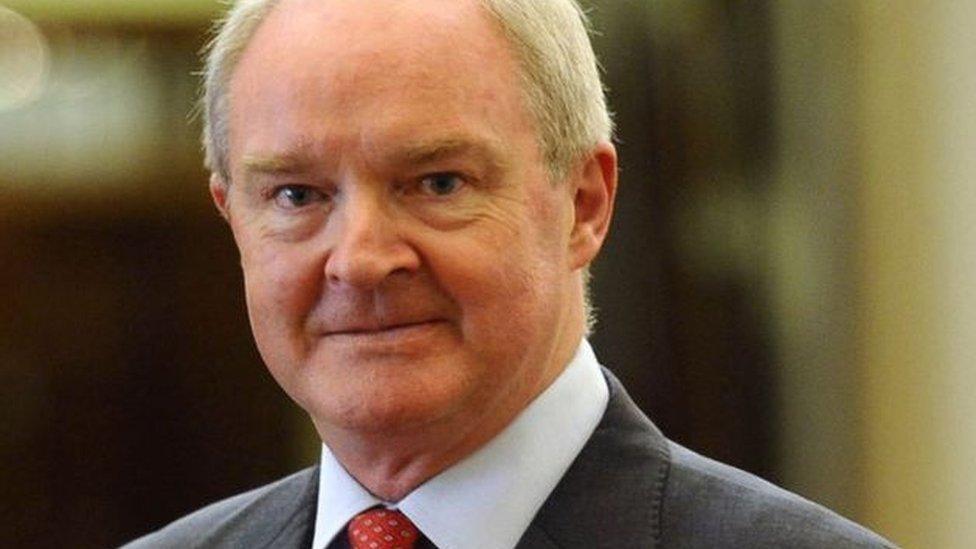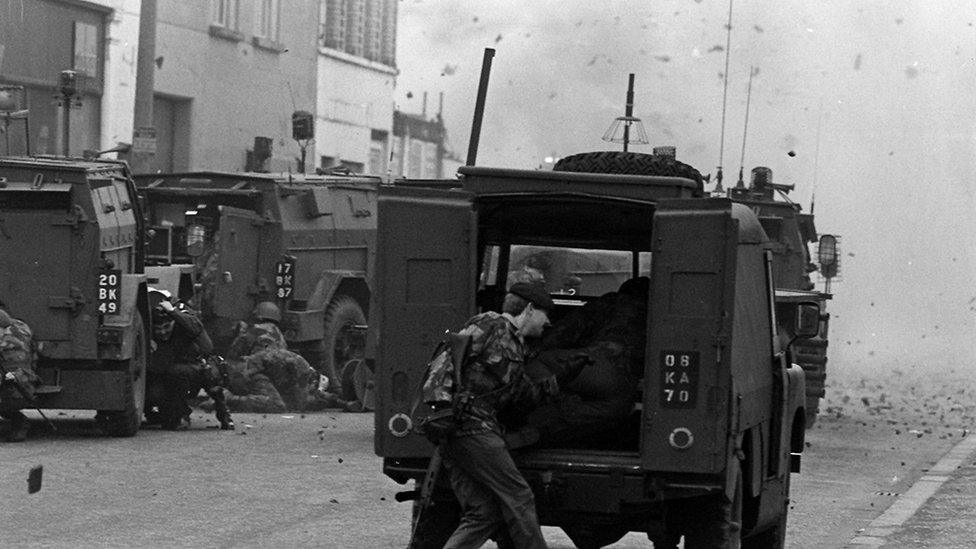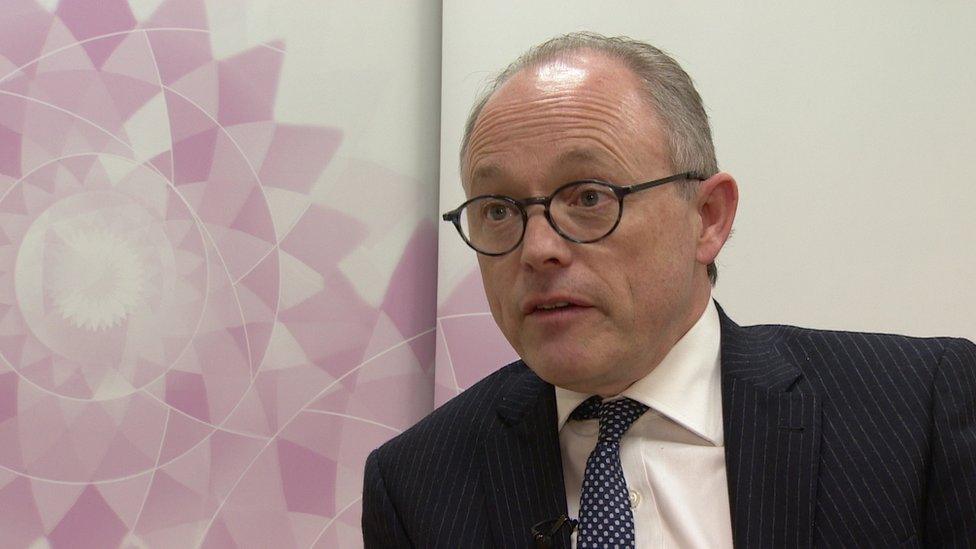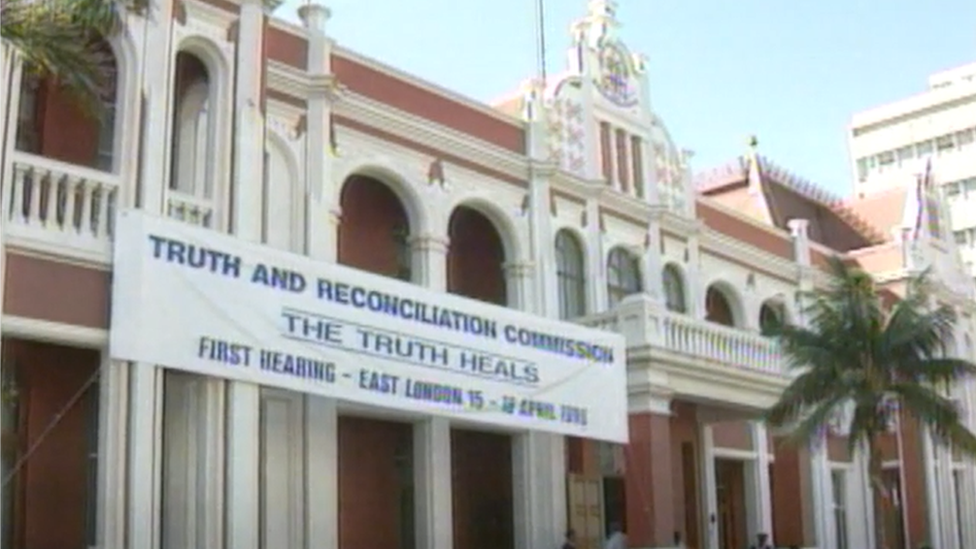NI Troubles: Bill on legacy issues 'presents an opportunity'
- Published

Sir Declan Morgan said the matter had "proven toxic" with Stormont parties
The government's bill dealing with so-called legacy issues presents an "opportunity", the former most senior judge in Northern Ireland has said.
Sir Declan Morgan said the matter had "proven toxic" with Stormont parties unable to deliver an alternative solution.
The bill would effectively draw a line under Troubles killings, but has been met with opposition in NI.
The ex-lord chief justice was speaking to Westminster's NI Affairs committee.
"The prize is so great I'm reluctant to accept the notion we should depart from this bill," he said.
The Northern Ireland Troubles (Legacy and Reconciliation) Bill runs to almost 100 pages.
It is an attempt to deal with more than 1,000 unsolved killings.
A central element involves immunity from prosecution for those who co-operate with investigations run by a new information recovery body.
Bereaved families can request investigations, as can the government and others.
Sir Declan told the committee on Wednesday that if a solution was found to the legacy issue, it would "remove a huge impediment to the development of politics on a consensual basis".
"If we depart [from the bill] it seems to me that the people we're talking about may well get nothing."
Sir Declan said he recognised there were also "challenges" with the legislation that the government would need to amend.
"My position is, if there are problems with this bill, we should seek to rescue them - I do not adhere to the view that it's beyond the capacity of the Houses of Parliament," he added.
"This is the first opportunity we've had to do something for all victims, I'd be horrified to think we'd lose the chance to do this."

Sir Declan was lord chief justice from 2009 until his term ended last year.
He had previously advanced a plan for having all remaining Troubles inquests dealt with within five years.
The new legislation will also prevent future inquests and civil actions related to the Troubles.
Civil claims which already existed on or before the day of the bill's introduction last month can continue, as will inquests which have reached substantive hearing stage a year after the bill, or by the time a new information recovery body becomes operational.
But Sir Declan said by that time, almost 20 outstanding inquests could still be awaiting a hearing.
"The question from a human rights perspective is potentially how do you justify preventing those 18 cases being heard?"
'Too woolly'
Former Director of Public Prosecutions in Northern Ireland Barra McGrory also gave evidence to the committee.
A central element of the bill involves immunity from prosecution for those who co-operate with investigations run by the new information recovery body.
Mr McGrory said the proposals were "far too woolly".
"This proposed system of immunity is very risky and will do untold damage to the criminal justice system as it stands," he said.
"The bill needs serious revision - I deeply desire a process that will bring us closer to reconciliation but that requires a firmer degree of accountability than this offers."

Former Director of Public Prosecutions in Northern Ireland, Barra McGrory, said the bill needed serious revision (archive image)
Sir Declan also claimed to the committee that he held back previous legacy proposals after Alliance told him it would be "unhelpful".
He said he had privately written to parties in August 2019 suggesting a forum for "victims to tell their story".
He described Alliance's response as "disappointing", but said it would have been "inappropriate" if he moved ahead.
But Alliance's Stephen Farry accused Sir Declan of "party political point scoring" by making the information public now.
Sir Declan said he had told the parties he wanted to "rejuvenate the Stormont House Agreement" and suggested a "bolt-on" public space to allow victims to share their experiences.
'Explosive claim'
The Stormont House Agreement, signed in 2014, committed to several new initiatives around legacy cases, including a Historical Investigations Unit to examine unsolved murders carried out during the Troubles.
"I got a letter from one of the parties to say they thought it would be unhelpful," he said.
"By that response I took the view I should not be stepping beyond what was considered to be my remit."
However, Mr Farry said Sir Declan's description of what had happened was "inconsistent".
"There was a proposal for a broader commission of inquiry, we did feel that was a drift away from Stormont House which wasn't helpful when we were in negotiations to restore the institutions."
DUP MP Ian Paisley described the claim from Sir Declan as "explosive".
"If anyone wants to see the truth in terms of why there was no consensus on the Stormont House Agreement, it's not unionists - it's a range of parties," he said.
The government's legacy bill is expected to have its next stage in the Commons next week.
Related topics
- Published17 May 2022

- Published14 May 2022
